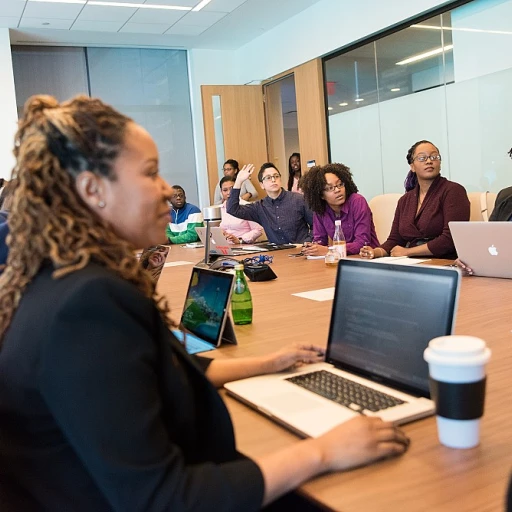
Understanding High Potential Employees
Recognizing the Promise
High potential employees are the individuals who, with the right guidance and support, can represent the future of a company. Companies invest in these individuals as part of a strategy to build a strong leadership pipeline. It's not just about identifying who these employees are; it's crucial to understand what makes them tick and how to nurture their growth effectively.
These employees demonstrate a unique blend of skills, motivation, and ambition. Their ability to drive personal and professional growth distinguishes them from their peers. In a competitive work environment, recognizing these attributes early can be pivotal. With the right coaching relationship, the journey towards personal growth becomes more structured and rewarding.
The Impact of Effective Relationships
Building effective coaching relationships is a process that hinges on trust, communication, and mutual respect. The role of a relationship coach is to foster an environment where open dialogue encourages personal professional development. The success of this partnership lies in addressing core competencies and aligning the goals of both the coach and the client.
A key factor is establishing goals that align with both the organizational objectives and the personal aspirations of the employee. This alignment not only boosts employee engagement but also strengthens the foundation of a successful coaching journey. By prioritizing the building trust aspect, both the coach and the coachee can navigate the coaching process more effectively, resulting in enriched outcomes for both parties.
The commitment of the coach to understanding the unique characteristics and ambitions of high potential employees is crucial. For more insights on this topic, you may want to explore this detailed article on the realities of mentoring high potential employees.
The Role of a Coaching Relationship
Building a Foundation of Trust and Understanding
Effective coaching hinges on the establishment of a strong coaching relationship, where trust and understanding form the bedrock for meaningful interactions. A coach must prioritize the creation of a safe environment for their clients, ensuring a space where open communication and genuine dialogue can flourish. Building trust requires dedication from both the coach and the coachee. Trust is not granted overnight; it calls for time and consistent effort to earn the client's confidence. Through active listening and empathy, a coach demonstrates their commitment to the client's growth and well-being.The Dual Role of Coaches
Coaches play a dual role in the lives of high potential employees. They serve as both guides and partners in the journey toward achieving personal and professional milestones. It's essential for the coach to understand their client's goals, as well as the unique challenges they may face within their work environment. Through nurturing effective coaching relationships, coaches facilitate the development of core competencies in leadership and decision-making. Moreover, understanding the client's needs and aspirations allows for personalized coaching sessions tailored to encourage growth and enhance employee engagement. To learn more about the realities of mentoring high potential employees and developing an effective coaching process, consider exploring this resource on the nuances of mentoring. This insightful article delves into the intricacies of effective guidance and relationship coaching, providing valuable perspectives on the coaching process.Fostering a Growth Mindset
Establishing a positive coach-client relationship is crucial for encouraging the coachee's growth mindset. A successful coaching endeavor involves setting clear, attainable goals while aligning with the professional aspirations of the client. An effective coach empowers their clients by promoting a mindset that embraces challenges as opportunities for development. By doing so, they not only inspire confidence but also cultivate resilience and adaptability in the face of change. To ensure the success of a coaching relationship, it's vital for coaches to maintain a balance between challenge and support, ultimately paving the way for meaningful personal growth and professional advancement.Key Elements of Successful Coaching
Building a Trustworthy Coaching Connection
Building trust is central to effective coaching, and it plays a crucial role in the relationship between the coach and the client. A successful coaching relationship is rooted in mutual respect and understanding. Here, we’ll explore three pivotal elements that contribute to this connection:- Establishing Clear Communication: Open and honest communication paves the way for a successful coaching journey. Both parties should actively listen and engage in dialogues where expectations are clear and respected.
- Fostering an Environment of Trust: Trust coaching involves creating a safe space where coachees feel free to express vulnerabilities, ask questions, and explore personal and professional growth. Addressing confidentiality within the coaching process ensures that the client's privacy policy is respected.
- Setting and Revisiting Goals Regularly: Aligning on personal and professional goals is crucial. Regularly revisiting and adjusting these goals as necessary maintains momentum and honors the coachee's evolving journey.
Strategies for Coaches
Crafting Strategies That Foster Sustainable Growth
Building effective coaching relationships with high potential employees involves innovative strategies that drive growth and success in both personal and professional domains. Coaches must focus on fostering an environment where trust, communication, and openness are paramount.- Prioritize Building Trust: Trust is the foundation of any successful coaching relationship. Coaches should demonstrate integrity, consistency, and reliability to earn the trust of their clients, creating a safe space for open dialogue and honest feedback.
- Set Clear Goals: Collaboratively establish specific, measurable goals with the coachee. These milestones guide the coaching process and offer clear benchmarks for personal and professional development.
- Engage in Active Listening: Coaches should practice active listening, ensuring they fully understand the client’s needs, aspirations, and challenges. This fosters a more effective coaching relationship by making the coachee feel valued and heard.
- Encourage Leadership Development: Helping high potential employees cultivate leadership skills is crucial for their long-term success. Coaches should encourage exploration of new responsibilities and leadership opportunities.
- Include Flexibility and Personalization: Recognize the unique requirements of each coachee and tailor coaching sessions to address individual needs. This personalization ensures that the coaching remains relevant and effective over time.
- Emphasize Professional Growth: Support the client’s pursuit of skills and knowledge that contribute to their professional journey. Facilitating a growth-oriented mindset can unlock potential career advancements and achievements.
Overcoming Common Challenges
Navigating Challenges with Confidence
The realm of coaching high potential employees is not without its hurdles. Both coaches and clients must navigate obstacles to ensure a seamless and effective coaching process. To cultivate a successful coaching relationship, professionals need to overcome these common challenges with strategic approaches and a proactive mindset:- Building and Maintaining Trust: Trust is the cornerstone of any coaching relationship. Coaches need to foster trust through active listening, transparency, and consistent communication. Establishing trust early on in the coaching process enhances the effectiveness of each session and ensures a safe space for the client's personal and professional growth.
- Coaching Confidentiality: Protecting the privacy and confidentiality of the coachee is paramount. A well-defined privacy policy and adherence to confidentiality protocols instill confidence in clients, allowing them to share openly without fear of exposure.
- Time Constraints: Balancing the demands of work, coaching sessions, and personal commitments can be challenging for both coaches and clients. Effective time management, setting clear goals, and prioritizing sessions can lead to more efficient use of time and contribute to a successful coaching experience.
- Clarifying Coaching Goals: Ambiguous or unrealistic goals can impede progress. Coaches must work with clients to clarify, set, and regularly revisit coaching goals to ensure alignment with personal and professional aspirations.
- Resistant or Unengaged Coachee: Occasionally, coachees may show resistance or lack of engagement. Coaches should strive to understand the root of such attitudes, employ patience, and use relationship-building strategies to rekindle enthusiasm and commitment.
- Cultural and Organizational Barriers: Each organization has its unique culture and challenges. Coaches need to tailor their approach to align with these cultural nuances, fostering a more relatable and impactful coaching relationship.
Measuring Success in Coaching
Evaluating Outcomes and Progress
In the realm of coaching, one crucial aspect is determining whether the coaching relationship has met its intended goals. This involves measuring success both quantitatively and qualitatively. When an organization invests time and resources into a coaching relationship, it's vital to assess the process to ensure that both the coach and the coachee are benefiting effectively.Tracking Client Growth and Development
- Goal Alignment: Establishing clear objectives at the start helps in assessing progress. Revisit these goals periodically to determine if they are still relevant and if the coachee is on track. This is an integral part of a successful coaching process as it ensures that both parties are working towards a shared vision.
- Feedback Mechanisms: Collecting regular feedback from both the coach and the coachee can provide insights into the effectiveness of the coaching sessions. This encourages open communication and trust within the coaching relationship.
- Behavioral Changes: Monitoring changes in the coachee’s behavior or approach in professional settings is a tangible way to measure success. This can be evident in their leadership roles, decision-making processes, or employee engagement.
Assessing Impact on Employee Engagement
The impact of coaching on employee engagement is another important indicator of success. Engaged employees are more productive and are typified by higher job satisfaction, often leading to better retention rates. To evaluate this:- Engagement Surveys: Utilize regular employee surveys to measure changes in engagement levels pre- and post-coaching. This provides a broader picture of how coaching impacts team morale and productivity.
- Performance Metrics: An increase in performance metrics post-coaching can indicate successful outcomes. It shows that the coachee is not only applying what they've learned but also contributing effectively to the organization.













